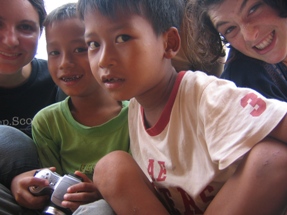Semester at Sea Fall
2006 Voyage 
- Home
- Lara's Bio
- Multi-sited
Ethnography: English Language Acquisition
- Life Herstory Interview
- Hawaii:
Surfer Boys
- Japan: Saki Balm
- China: Migration as a Hobby
- Vietnam: Balancing a Language
Barrier
- Burma:
Juvenile Multi-linguists
- India: Princess of Erode
- Egypt: Belly Dancing
Double-Standard
- Turkey: Turkish Delights
- Open Letter
Juvenile Multi-linguists
by Lara Calloway
The
moment I
stepped on to the complex of the renowned Ananda Pagoda, in
“What’s your name? Where are you from? Hello, hello! Postcards, postcards! One dollar, one dollar, one dollar…” I tired of declining before we even reached the top, and resorted to simply ignoring her. Exasperated with my irresponsiveness, she jerked my hand and said, “Scusi! Bon giorno. Come ti chiami? Poste? Un’ Euro.”
That got my attention. “Che?” I asked, turning to look at her. She beamed and repeated her Italian inquiry. How much did she know? I tested. “Come ti chiami?”
“Mi chiamo Aung Kyaw.” Listening in and catching on, the rest of the horde started up, assaulting me and my companions with waves of “Scusi! Poste! Un’ Euro!” I glanced around at all of them, shocked. Could they all speak Italian?

“Quanti
anni
hai?” I asked her age, intrigued.
“Ocho.” Spanish. I mused. Grabbing up her postcards I asked, “Quale?” (How many?) She pointed to each one in turn and counted out loud, “Uno, dos, tres, quattro, cinco…” Spanish again. Behind me, I could hear a boy trying my friend Liz in French. Aung Kyaw continued her insistent counting, mixing in an occasional “trois” or “seven” or “nove.”
These
adolescent
touts all speak enough to carry on a small conversation in English,
Italian,
French, and Japanese; languages their parents can’t speak, all picked
up from
tourists. The requisites of necessity. As mentioned in Migrant
and Domestic Workers: From Burma to Thailand from The
Institute of Population and Social Research (
I was initially relieved that she’d taken the words right out of my mouth, but it was a colloquialism that she obviously didn’t quite understand, as she continued to hound me before I could even nod “yes.” How many people before me have said those words for her to repeat them like a mantra until a dollar goes in her little sandy hands?
I took the postcards she was forcing into my palm. “Where do you get these?” I tried to ask. She didn’t understand. I waved them at her like she’d been doing to me. “Who gives these to you to sell?” Big brown eyes stared blankly up into mine. “Money money money!” she said, and shoved another rubber banded bundle into my hand.
Defeated, I reached into my pocket and experimented once more with Japanese, asking her how much her postcards cost. “Dokko deska?”
“One dollar,” she repeated. I wasn’t sure if she was answering my question or just coincidentally yelling the price at the right moment. Taking my dollar bill she added cleverly, “Ma tu non parle Giapponese…” (But you don’t speak Japanese).
“You are very smart.” I complimented, taking my postcards.
“Thank you,” she responded, her eyes heavy and bright.